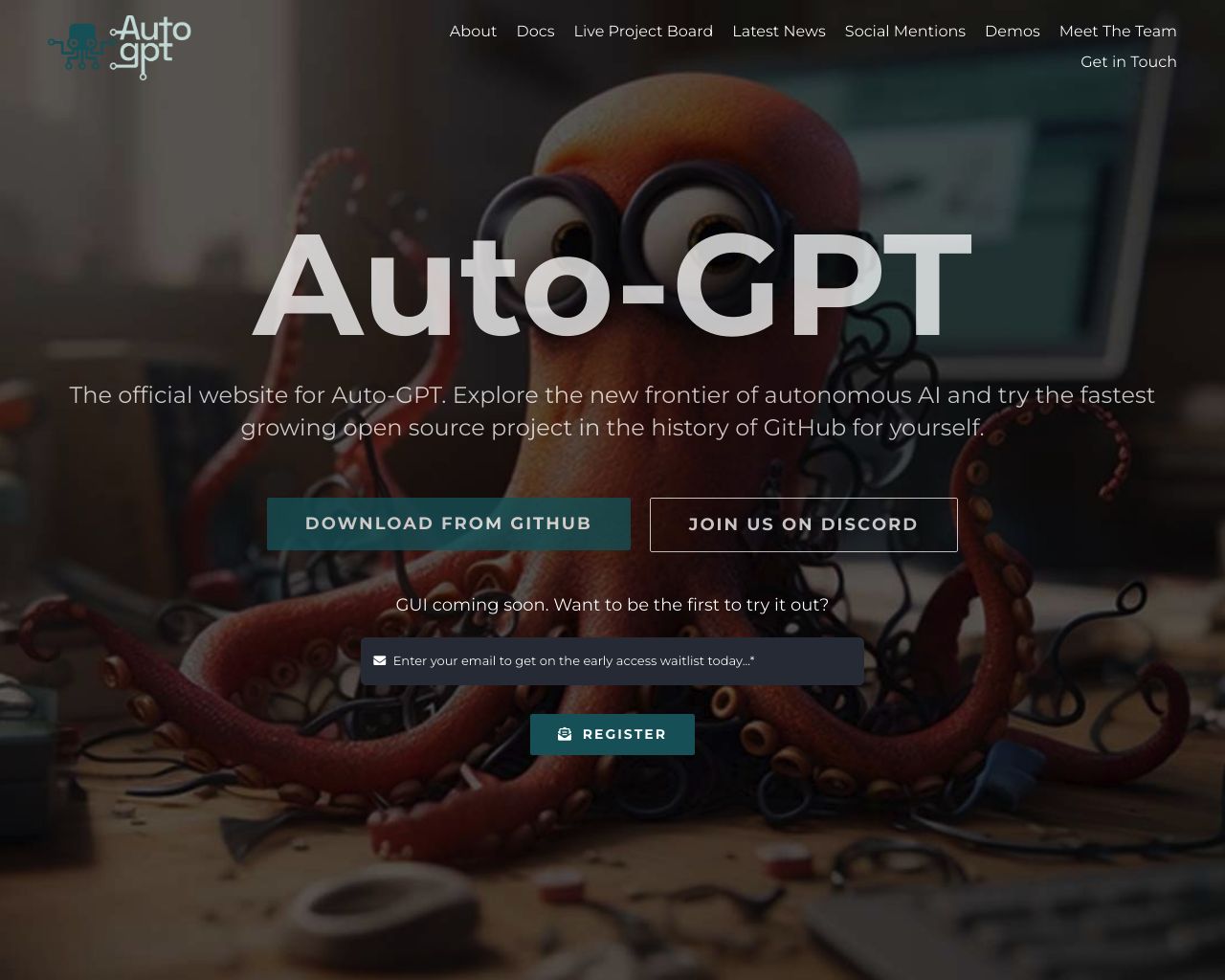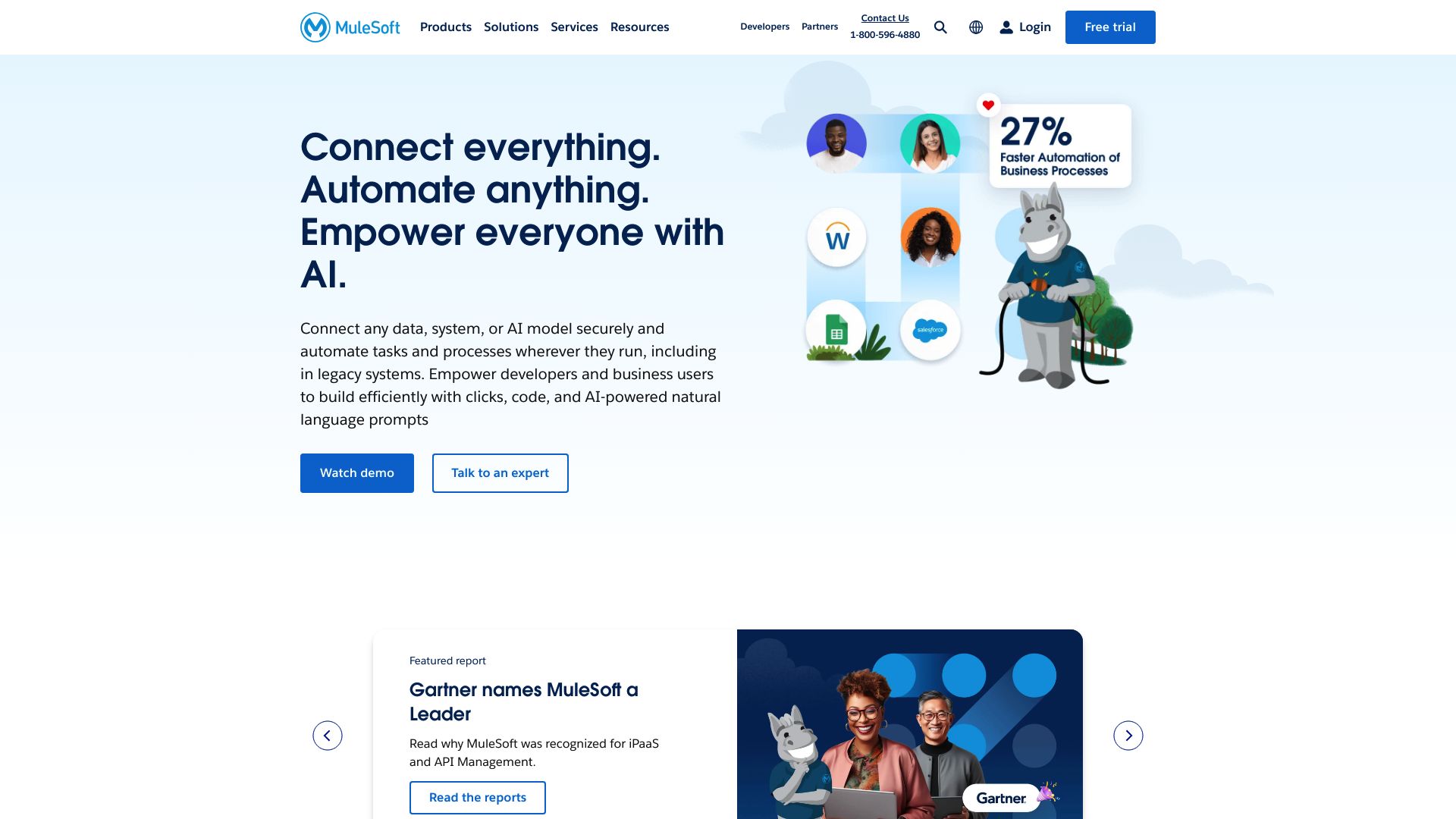AutoGPT vs. Mulesoft: Comparing AI Automation and Integration
AI platforms AutoGPT vs. Mulesoft offer powerful solutions for businesses seeking to harness artificial intelligence, but each takes a distinct approach. AutoGPT creates autonomous AI agents for complex tasks, while Mulesoft specializes in enterprise API management and integration. This comparison delves into their key features, strengths, and limitations to help you determine which platform best suits your needs.
We’ll explore how AutoGPT’s task automation capabilities stack up against Mulesoft’s comprehensive integration tools, and introduce SmythOS as a compelling alternative that combines the strengths of both platforms. Whether you’re a developer looking to build advanced AI workflows or a business leader seeking seamless system integration, this analysis provides the insights you need to make an informed decision in today’s AI-driven landscape.
AutoGPT Overview
AutoGPT empowers developers to create autonomous AI agents capable of completing complex tasks without constant human input. This open-source platform harnesses GPT-4 or GPT-3.5 APIs to build agents that self-prompt, make decisions, and execute multi-step processes independently.


AutoGPT’s visual builder simplifies agent creation through a drag-and-drop interface, allowing users to construct AI workflows without extensive coding knowledge. The platform excels at breaking down large tasks into manageable sub-tasks, maintaining short-term memory for context, and retrieving real-time information from the internet to inform decision-making.
AutoGPT empowers developers to create autonomous AI agents capable of completing complex tasks without constant human input.
Key features include multimodal input processing (text and images), a debug mode for troubleshooting, and support for REST API integration. AutoGPT enables deployment as an API using Docker, offering scalability for growing projects. The platform’s autonomous capabilities shine in areas like software development, market research, and content creation.
Despite its strengths, AutoGPT faces challenges. The system can be prone to errors from self-feedback loops and lacks long-term memory, potentially affecting performance in extended tasks. Additionally, the recursive nature of its operations can lead to high costs, and the platform may occasionally struggle with hallucinations or infinite loops.
AutoGPT’s vision aims to push the boundaries of artificial general intelligence (AGI). While it offers a glimpse into the future of autonomous AI, users should weigh its innovative features against potential limitations when considering it for their projects.
Mulesoft Overview
Mulesoft delivers a comprehensive integration platform designed to connect data, applications, and devices across on-premises and cloud computing environments. The Anypoint Platform enables organizations to design, build, and manage APIs that facilitate seamless connectivity between disparate systems.


Mulesoft’s API-led connectivity approach empowers businesses to create reusable assets, enhancing efficiency and security across digital touchpoints. The platform’s integration capabilities extend to AI implementations, enabling organizations to connect data silos and leverage AI for personalized interactions across various business functions.
Mulesoft’s API-led connectivity approach empowers businesses to create reusable assets, enhancing efficiency and security across digital touchpoints.
Key features of the Anypoint Platform include full-lifecycle API management, from design and development to deployment and monitoring. Mulesoft’s next-generation IDE, Anypoint Code Builder, incorporates Einstein AI to accelerate project initiation through natural language prompts, significantly boosting developer productivity.
Security and governance remain paramount in Mulesoft’s offerings. The Anypoint Flex Gateway and API Governance tools ensure secure and controlled API management, critical for AI and data integration initiatives. These features position Mulesoft as a robust solution for enterprises seeking to navigate the complexities of modern integration challenges while maintaining stringent security standards.
While Mulesoft excels in enterprise-grade integration and API management, its learning curve may pose challenges for smaller organizations or those new to API-led approaches. The platform’s extensive capabilities often require specialized expertise to fully leverage, potentially increasing implementation time and costs for some users.
Feature Comparison
AutoGPT and Mulesoft represent distinct approaches to AI and integration. AutoGPT focuses on autonomous AI agents capable of complex task completion, while Mulesoft specializes in enterprise-grade API management and integration.
AutoGPT excels in creating AI agents that can operate independently, breaking down tasks and making decisions without constant human input. It supports multimodal inputs, including text and images, and provides a visual builder for constructing AI workflows. However, AutoGPT lacks some core enterprise features like hosted environments, long-term memory, and robust security measures.
Mulesoft, on the other hand, offers comprehensive API lifecycle management and integration capabilities crucial for enterprise environments. Its Anypoint Platform enables full API governance, secure gateway management, and AI-assisted development through Anypoint Code Builder. While Mulesoft facilitates AI integration, it does not inherently create autonomous AI agents like AutoGPT.
The platforms diverge significantly in their security and deployment features. Mulesoft provides enterprise-grade security with features like data encryption and OAuth, which are not explicitly mentioned for AutoGPT. Mulesoft also offers more diverse deployment options and scalability features tailored for large-scale enterprise use, whereas AutoGPT’s deployment capabilities appear more limited.
Feature Comparison Table
| AutoGPT | Mulesoft | SmythOS | |
|---|---|---|---|
| CORE FEATURES | |||
| Hosted Agents (Dev, Production) | ❌ | ✅ | ✅ |
| Memory & Context | ✅ | ❌ | ✅ |
| Explainability & Transparency | ❌ | ❌ | ✅ |
| Problem-Solving Capabilities | ✅ | ❌ | ✅ |
| Human-AI Interaction | ✅ | ❌ | ✅ |
| Audit Logs for Analytics | ❌ | ❌ | ✅ |
| Agent Work Scheduler | ❌ | ✅ | ✅ |
| SECURITY | |||
| Constrained Alignment | ❌ | ✅ | ✅ |
| Data Encryption | ✅ | ❌ | ✅ |
| IP Control | ❌ | ✅ | ✅ |
| COMPONENTS | |||
| Huggingface AIs | ✅ | ❌ | ✅ |
| Zapier APIs | ✅ | ❌ | ✅ |
| All other APIs, RPA | ✅ | ❌ | ✅ |
| Logic | ✅ | ❌ | ✅ |
| Data Lakes | ❌ | ✅ | ✅ |
| DEPLOYMENT OPTIONS (EMBODIMENTS) | |||
| Staging Domains | ❌ | ✅ | ✅ |
| Production Domains | ❌ | ✅ | ✅ |
| Deploy as Scheduled Agent | ❌ | ❌ | ✅ |
| Scalability | ✅ | ❌ | ✅ |
| DATA LAKE SUPPORT | |||
| Hosted Vector Database | ❌ | ✅ | ✅ |
| Sitemap Crawler | ❌ | ❌ | ✅ |
| YouTube Transcript Crawler | ❌ | ❌ | ✅ |
| URL Crawler | ✅ | ❌ | ✅ |
| PDF Support | ✅ | ❌ | ✅ |
Best Alternative to AutoGPT and Mulesoft
SmythOS stands out as a superior alternative to AutoGPT and Mulesoft, offering a comprehensive AI automation platform that combines the best of both worlds. We’ve designed SmythOS to empower users with advanced AI capabilities while providing the robust integration and deployment options enterprises require.
Unlike AutoGPT’s focus on autonomous agents and Mulesoft’s emphasis on API management, SmythOS delivers a versatile solution that excels in both areas. Our platform enables the creation of sophisticated AI agents through an intuitive drag-and-drop interface, making it accessible to users of all skill levels. This visual approach, coupled with our extensive library of pre-built components, accelerates development and reduces the learning curve typically associated with AI implementation.
SmythOS delivers a versatile solution that excels in both areas. Our platform enables the creation of sophisticated AI agents through an intuitive drag-and-drop interface…
SmythOS shines in its enterprise-ready features, addressing the limitations of both AutoGPT and Mulesoft. We offer seamless deployment across multiple environments, including development and production, with built-in staging capabilities. Our platform ensures top-notch security through data encryption, OAuth integration, and IP controls, providing the peace of mind that Mulesoft users expect while surpassing AutoGPT’s offerings in this critical area.
Where SmythOS truly excels is in its unparalleled flexibility and scalability. Our platform supports a wide array of AI models, integrations, and deployment options, allowing users to create and manage AI agents that can be utilized as APIs, chatbots, scheduled tasks, or even GPT plugins. This versatility, combined with our robust multi-agent collaboration features, enables businesses to tackle complex workflows and automate processes across departments with ease.
SmythOS truly excels is in its unparalleled flexibility and scalability. Our platform supports a wide array of AI models, integrations, and deployment options…
By choosing SmythOS, users gain access to a platform that not only meets but exceeds the capabilities of AutoGPT and Mulesoft. We offer the autonomous agent functionality of AutoGPT with enhanced explainability and debugging tools, alongside the enterprise-grade integration and scalability features reminiscent of Mulesoft. With SmythOS, businesses can confidently build, deploy, and manage AI solutions that drive innovation and efficiency across their organization.
Conclusion
AutoGPT and Mulesoft offer distinct approaches to AI and integration, each with unique strengths and limitations. AutoGPT excels in creating autonomous AI agents for complex task completion, while Mulesoft provides robust API management and enterprise-grade integration solutions.
While AutoGPT’s ability to operate independently and break down tasks is impressive, it lacks some essential enterprise features like long-term memory and comprehensive security measures. Mulesoft, on the other hand, delivers full API lifecycle management and AI-assisted development but doesn’t inherently create autonomous AI agents.
SmythOS emerges as the superior choice, combining the strengths of both platforms while addressing their limitations. Our platform offers autonomous agent creation, enterprise-grade security, and seamless integration capabilities. SmythOS’s visual builder simplifies AI workflow construction, while our extensive feature set – including multimodal support, debug mode, and scalable deployment options – provides unparalleled flexibility and power.
For businesses and developers seeking a comprehensive AI solution that balances autonomy, integration, and enterprise readiness, SmythOS stands out as the clear winner. We invite you to explore our diverse range of AI-powered agent templates and experience unlimited AI automation risk-free. Unleash the power of AI for your business with SmythOS – where innovation meets practicality.
Last updated:
Disclaimer: The information presented in this article is for general informational purposes only and is provided as is. While we strive to keep the content up-to-date and accurate, we make no representations or warranties of any kind, express or implied, about the completeness, accuracy, reliability, suitability, or availability of the information contained in this article.
Any reliance you place on such information is strictly at your own risk. We reserve the right to make additions, deletions, or modifications to the contents of this article at any time without prior notice.
In no event will we be liable for any loss or damage including without limitation, indirect or consequential loss or damage, or any loss or damage whatsoever arising from loss of data, profits, or any other loss not specified herein arising out of, or in connection with, the use of this article.
Despite our best efforts, this article may contain oversights, errors, or omissions. If you notice any inaccuracies or have concerns about the content, please report them through our content feedback form. Your input helps us maintain the quality and reliability of our information.
